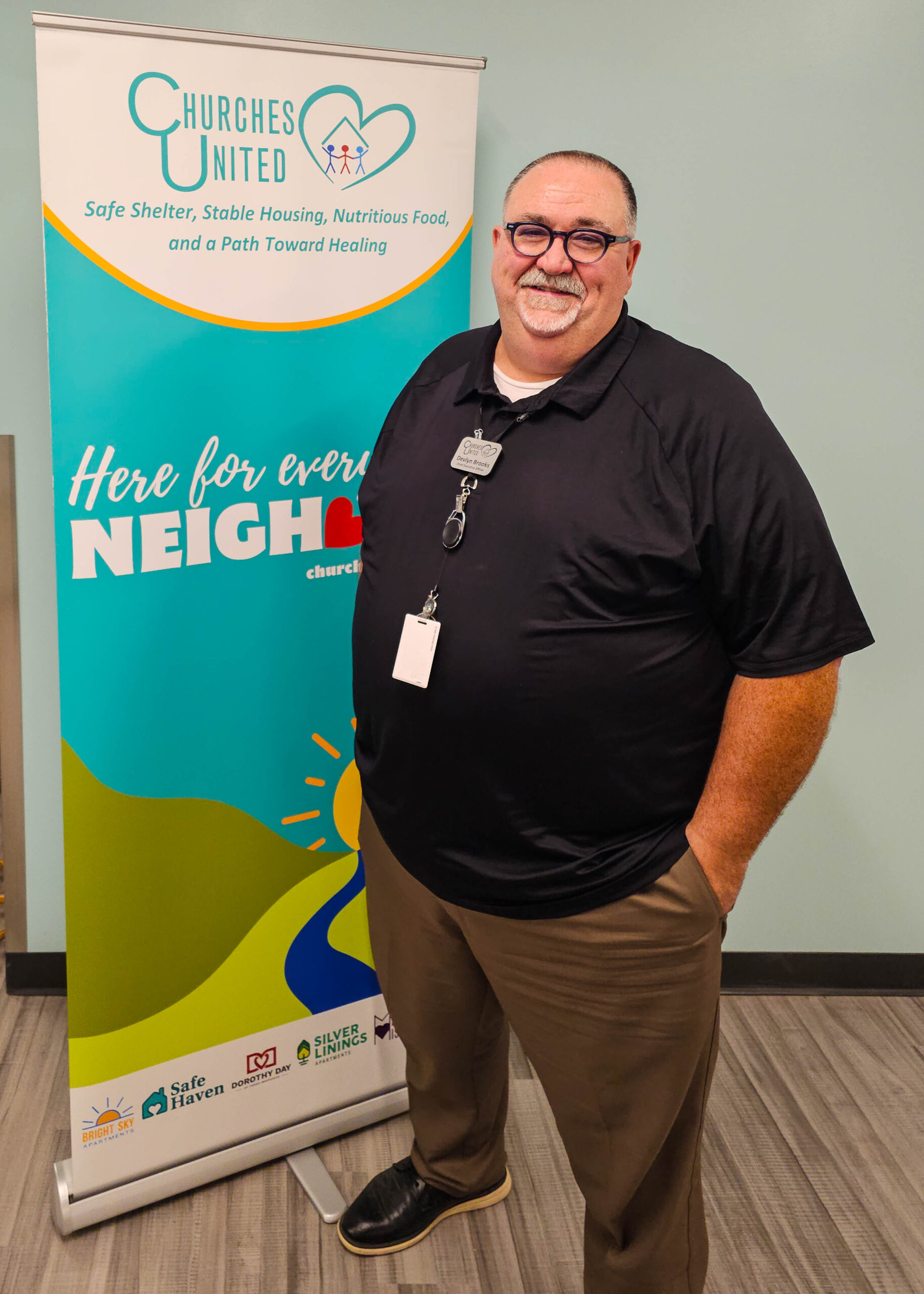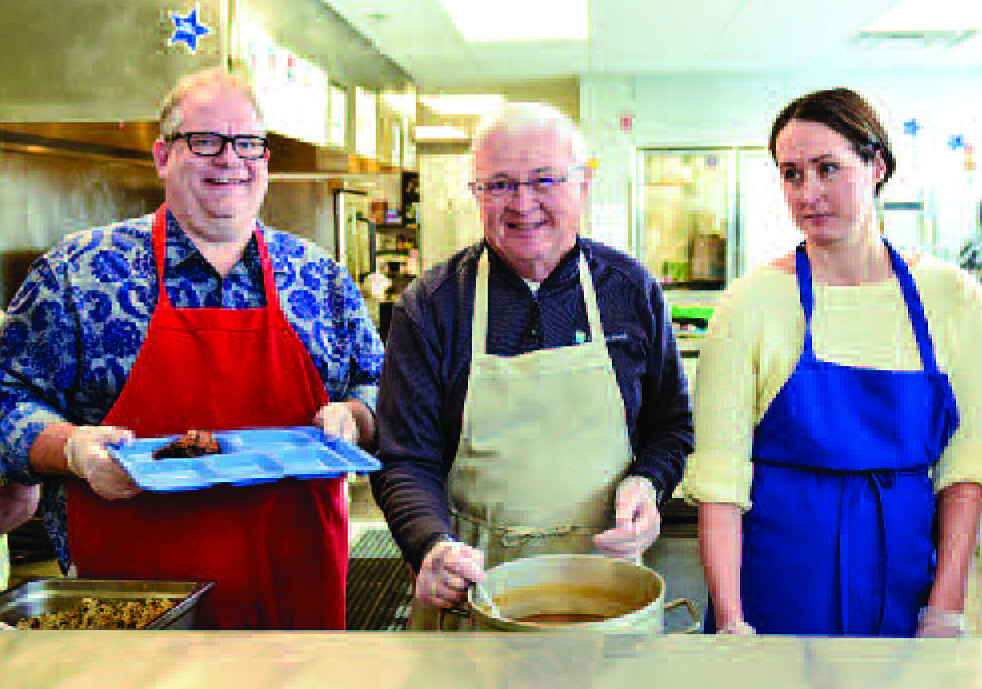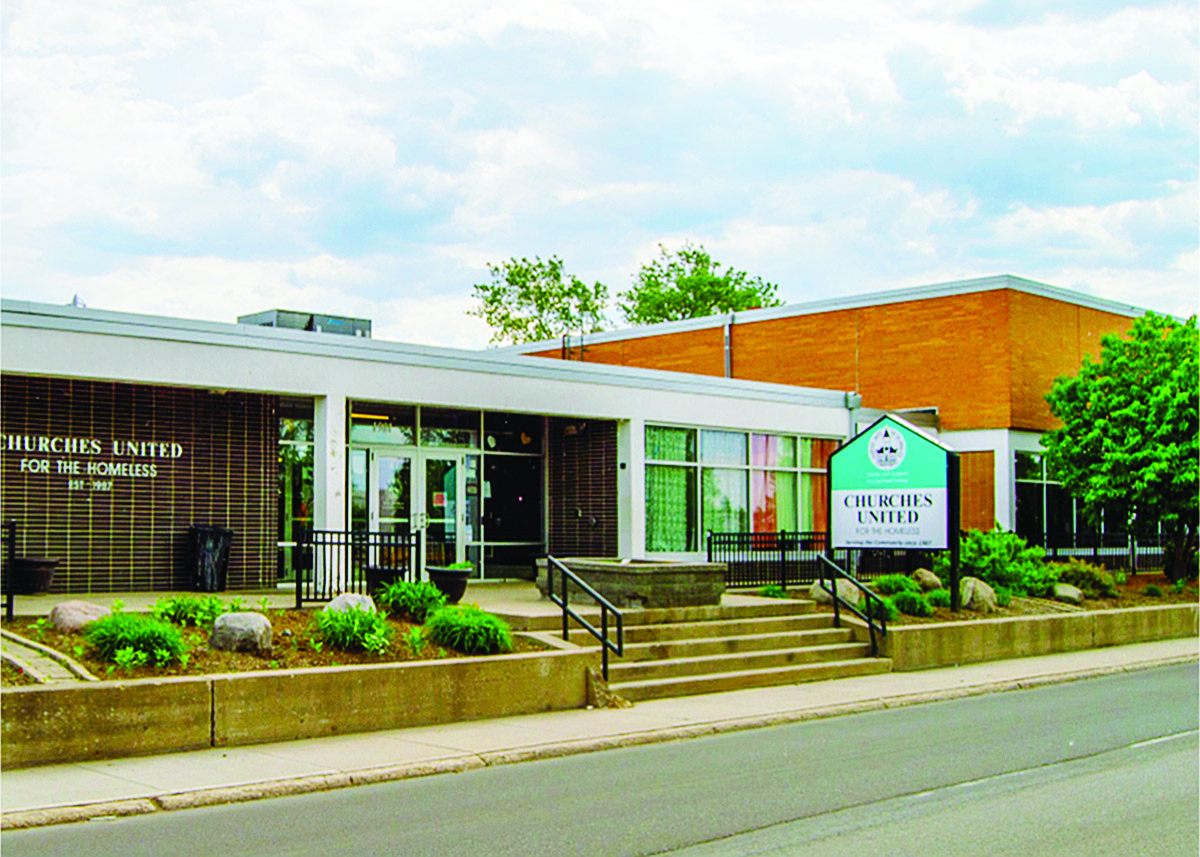
Pastor Devlyn Brooks says a long-term collaboration between individual givers, churches, and the community is needed — along with state support — to sustain Churches United. (Photo/Nancy Hanson.)

Churches United is still working to bring back the volunteers who help serve meals, staff its food pantry and do other tasks in the Micah’s Mission shelter. The COVID pandemic disrupted its former volunteer program.
Nancy Edmonds Hanson
The next seven months will be critical for Churches United for the Homeless – as critical as the looming winter is for the individuals and families it serves. But Pastor Devlyn Brooks, who took over the charity’s leadership in the heat of summer, sees a light at the end of the tunnel.
And he has hope.
“I believe the community is going to step in and help us get to July 1,” he says. “Now, that’s the pastor speaking. But I just believe we will, together, find a solution.”
He adds, “I don’t believe God brought me here to close the place down. We are going to get through this.”
The situation has been dire for the nonprofit shelter, day program and food pantry it operates since last summer, when Brooks stepped in as its director. A “perfect storm” of issues mostly out of its control had shaken it to its financial roots.
In August, on the Monday on which he took charge, he revealed the nonprofit couldn’t make payroll without an emergency infusion of gifts by Wednesday. Another $140,000 was needed by month’s end to keep the doors open.
Fargo-Moorhead roared its response, contributing more than double – over $400,000 – in the next two weeks. “Most of it came in by $25 or $50 or $100,” the executive director reports. “We received gifts from more than 800 donors. There was a little bit of foundation money in there, but the vast majority was given by Jane and John Does.
“Without them, we wouldn’t be here today. They gave us the runway to tell our story and rebuild community support.”
But the challenge remains. Month by month, Churches United needs to raise 70% of the $200,000 required to continue to shelter children, women and men in the 120-bed Micah’s Mission, serve 6,000 hot meals in its cafeteria, and distribute food from the Dorothy Day Food Pantry to 5,500 needy households evenly split between Minnesota and North Dakota.
Established almost 40 years ago by 11 local congregations, Churches United has been a mainstay of Fargo-Moorhead’s mission to care for families and individuals in need. Today’s crisis, Brooks explains, is rooted in several changes that have quietly flown under the radar.
He points to the COVID pandemic and its aftermath as a primary culprit: “The pandemic broke everything. Our numbers increased. At the same time, though. the state told us we could no longer bring in volunteers, so we staffed up to meet the need.
“The pandemic-era federal and state funding that had sustained us dropped off in 2022. At the same time, personal giving diminished dramatically – by 35% in 2021-2022 and another 15 to 17% the next year.” Church support, too, fell, as congregations faced the same kinds of challenges.
And then there was the elusive Employee Retention Tax Credit. The refundable tax credit was passed by Congress as part of the CARES Act in 2020 to aid “certain eligible businesses and tax-exempt organizations that had employees and were affected during the COVID-19 pandemic.” Churches United qualified for $1.2 million.
But the check wasn’t in the mail. Instead, the Internal Revenue Service was deluged with 85,000 applications – at least 35,000 of them fraudulent. A moratorium halted payments in September 2023 as the IRS sorted out the bogus claims to ensure compliance. Since then, the agency reports on its website, those who applied before the moratorium have seen a slow and steady process, but many are still awaiting decisions on their claims.” Among them: Churches United.
While the agency waited for the promised funds, its leadership opened two lines of credit to tide it over until the check arrived. But the tax credit has never come.
Brooks says more measures have been taken to reduce the monthly budget. A quarter of Churches United’s staff was laid off in October. Reducing staff, however, has its own cost. Attendance in the facility’s walk-in community center, which is open to all from 8 a.m. to 8 p.m., has gone up because of Fargo’s elimination of homeless camps along the river.
Brooks observes, “When they were in the encampment, these people tended to stay there. Now they come to us, not just to eat, but to find community. Where else will they find it?”
That means, he says, that “the number who come to us in an altered state – intoxicated, perhaps, or high or suffering from a mental health issue – has increased. At the same time, we have fewer staff now. When our staff have less presence, our guests are more likely to take matters into their own hands.” Result: More calls to the police. “Our ability to manage what we see unfolding now is severely limited. We’re concerned about our staff’s safety as well as those who live here.”
Despite the complex issues that face Churches United, the pastor is looking ahead with hope.
“Here’s the big picture,” he says. “We’re focused on getting to July 1. We have been assured that Minnesota has emergency shelter funding that will be available at the beginning of the new fiscal year. We just have to get from Nov. 1 to June 30.”
Brooks says that the community perhaps could have learned about Churches United’s problems sooner. Now that the story is on Page One, he is taking every opportunity to sharing it, doing his best to trigger the same enthusiastic support that has sustained its programs through most of its history.
He is the opposite of shy. “Since Aug. 12, I’ve talked to 125 service clubs, churches and every kind of organization that will have me,” he says with a wide smile. “We need to build up our volunteers again. We need them to understand and tell our story.
“I firmly believe the community is going to step in. This organization can’t sustain trying to raise more than $100,000 to pay its bills every month. We need to come up with a long-term collaboration between individuals, businesses, churches, the cities and the states.
“Churches United is just too important to our community to shut our doors,” he emphasizes. “Where will these people go? There are no quick and easy answers, but a solution is out there.”
Smiling, he says, “Remember, this is a pastor talking. I have faith that we will come through this stronger than ever. We just have to figure out how.”



